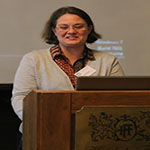Euroacademia Conferences
 Europe Inside-Out: Europe and Europeanness Exposed to Plural Observers (9th Edition) April 24 - 25, 2020
Europe Inside-Out: Europe and Europeanness Exposed to Plural Observers (9th Edition) April 24 - 25, 2020 Identities and Identifications: Politicized Uses of Collective Identities (9th Edition) June 12 - 13, 2020
Identities and Identifications: Politicized Uses of Collective Identities (9th Edition) June 12 - 13, 2020 8th Forum of Critical Studies: Asking Big Questions Again January 24 - 25, 2020
8th Forum of Critical Studies: Asking Big Questions Again January 24 - 25, 2020 Re-Inventing Eastern Europe (7th Edition) December 13 - 14, 2019
Re-Inventing Eastern Europe (7th Edition) December 13 - 14, 2019 The European Union and the Politicization of Europe (8th Edition) October 25 - 26, 2019
The European Union and the Politicization of Europe (8th Edition) October 25 - 26, 2019 Identities and Identifications: Politicized Uses of Collective Identities (8th Edition) June 28 - 29, 2019
Identities and Identifications: Politicized Uses of Collective Identities (8th Edition) June 28 - 29, 2019 The European Union and the Politicization of Europe (7th Edition) January 25 - 26, 2019
The European Union and the Politicization of Europe (7th Edition) January 25 - 26, 2019 7th Forum of Critical Studies: Asking Big Questions Again November 23 - 24, 2018
7th Forum of Critical Studies: Asking Big Questions Again November 23 - 24, 2018 Europe Inside-Out: Europe and Europeanness Exposed to Plural Observers (8th Edition) September 28 - 30, 2018
Europe Inside-Out: Europe and Europeanness Exposed to Plural Observers (8th Edition) September 28 - 30, 2018 Identities and Identifications: Politicized Uses of Collective Identities (7th Edition) June 14 - 15, 2018
Identities and Identifications: Politicized Uses of Collective Identities (7th Edition) June 14 - 15, 2018
The Romanian Avant-garde – Eastern Modernity With (a) Western Touch(es)
-
-

-
Presentation speakers
- Ana-Maria Stan, Babes-Bolyai University, Cluj-Napoca, Romania
- Download presentation
Abstract:
The present study aims to discuss some of the intricate relationships established between the Romanian avant-garde artists and their Western counterparts, in the wider context of Romania’s sociopolitical and cultural modernization which started after the end of WWI. Although placed at the geographical and cultural periphery of Europe, the Romanians were key actors in one of the most important trends of modernity from the first half of the XXth century – the avant-garde – . The way they (re)acted to the literary, artistic and political ideas invented, disseminated or supported by the European avant-garde is a proof that the multifaceted dialogue generated by this cultural movement dissolved imaginary and practical boundaries and overcame many of the discrepancies and differentiations still present between the East and the West. Romanians were not only exporting avant-garde artists to the Western scene (Tzara, Fondane), but were also assimilating the latest avant-garde ideas into innovative literary and artistic trends within their own national cultural framework (see the emergence of Integralism). At the same time, they were debating or propagating political ideas, sometimes even actively taking stances both on the national and the international scene. Consequently, the avant-garde artists were constantly challenging wider audiences to react to their concepts and beliefs, having a significant role in the modernization of mentalities. By taking into account the literary manifests, the articles they published in the cultural and mainstream press, and the personal contacts they established with Western avant-garde personalities (as for example Marinetti) we intend to bring a new perspective to the East versus West debate.
-
Related Presentations

















